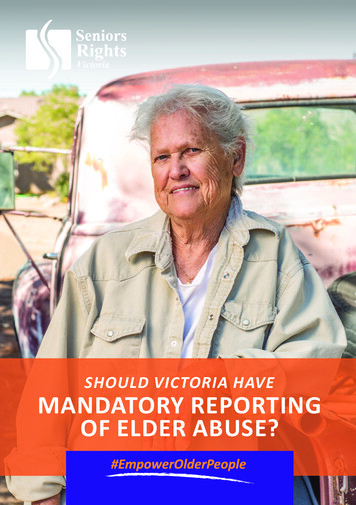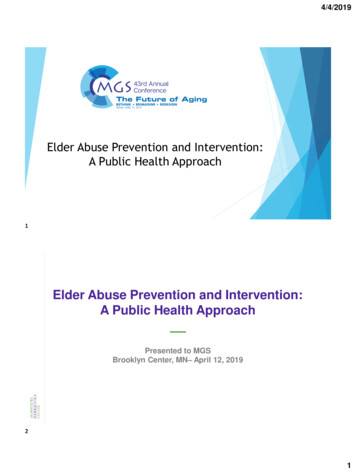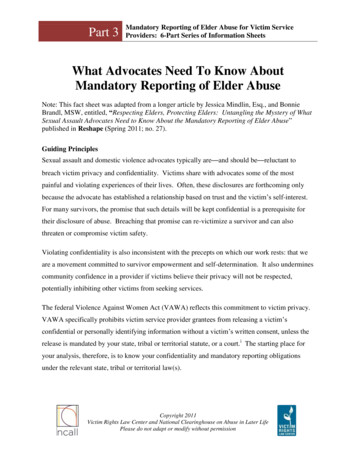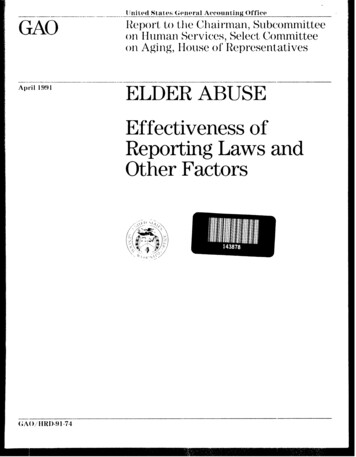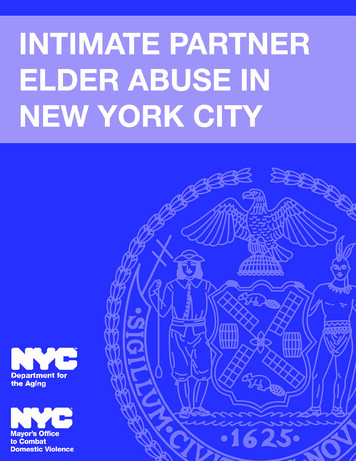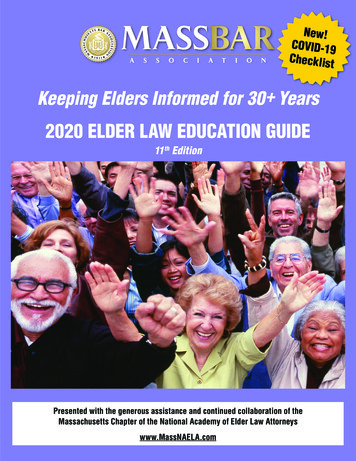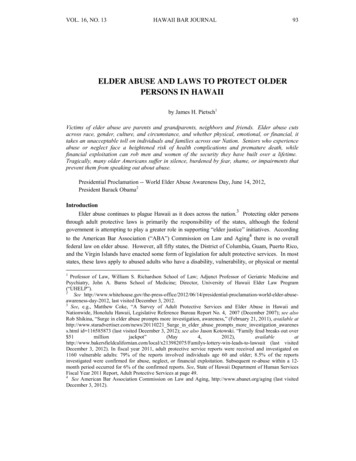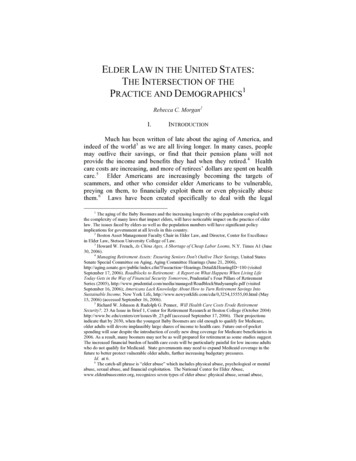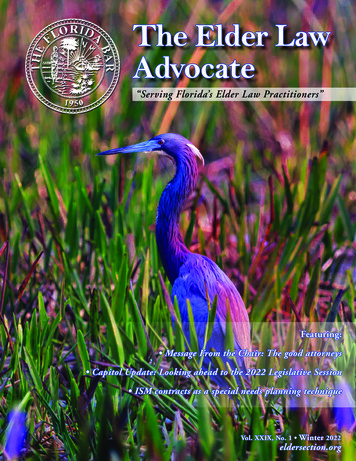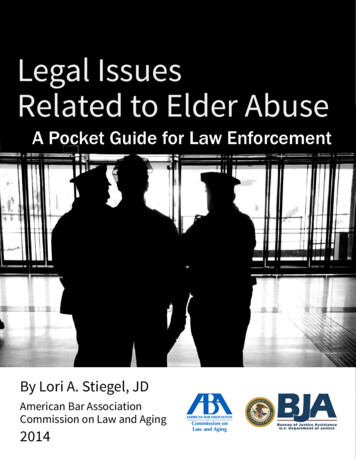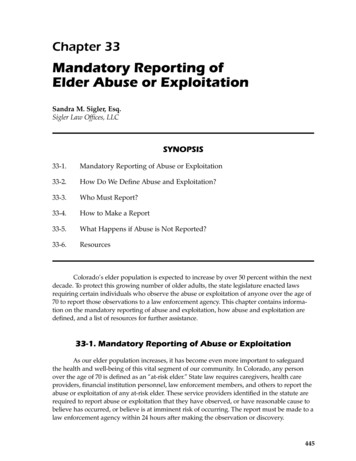
Transcription
Chapter 33Mandatory Reporting ofElder Abuse or ExploitationSandra M. Sigler, Esq.Sigler Law Offices, LLCSYNOPSIS33-1.Mandatory Reporting of Abuse or Exploitation33-2.How Do We Define Abuse and Exploitation?33-3.Who Must Report?33-4.How to Make a Report33-5.What Happens if Abuse is Not Reported?33-6.ResourcesColorado’s elder population is expected to increase by over 50 percent within the nextdecade. To protect this growing number of older adults, the state legislature enacted lawsrequiring certain individuals who observe the abuse or exploitation of anyone over the age of70 to report those observations to a law enforcement agency. This chapter contains information on the mandatory reporting of abuse and exploitation, how abuse and exploitation aredefined, and a list of resources for further assistance.33-1. Mandatory Reporting of Abuse or ExploitationAs our elder population increases, it has become even more important to safeguardthe health and well-being of this vital segment of our community. In Colorado, any personover the age of 70 is defined as an “at-risk elder.” State law requires caregivers, health careproviders, financial institution personnel, law enforcement members, and others to report theabuse or exploitation of any at-risk elder. These service providers identified in the statute arerequired to report abuse or exploitation that they have observed, or have reasonable cause tobelieve has occurred, or believe is at imminent risk of occurring. The report must be made to alaw enforcement agency within 24 hours after making the observation or discovery.445
2017 Colorado Senior Law HandbookEffective as of July 1, 2016, the reporting requirement includes the reporting of abuseor exploitation of an at-risk adult with an intellectual and developmental disability (HouseBill 16-1394). The legislative declaration states that “fear of mistreatment is one of the majorpersonal concerns of at-risk persons and that at-risk persons are more vulnerable to and disproportionately damaged by crime in general but, more specifically, by abuse, exploitation,and neglect because they are less able to protect themselves against offenders, a number ofwhom are in positions of trust.”33-2. How Do We Define Abuse and Exploitation?Abuse takes many forms. Elder abuse can include physical, sexual, or emotionalabuse; neglect; or financial exploitation. Elder abuse can impact your neighbor, your businesspartner, your family, or you. It is often hidden, and if no action is taken it can have devastating consequences.Abusers often exert their control over seniors so they can gain a benefit for themselves, such as money or a place to stay. Various tactics include physical and verbal abuseand intimidation, along with isolating victims to prevent them from talking to others aboutthe exploitation or abuse.Colorado law defines abuse of an at-risk elder as the non-accidental infliction of bodily injury or death, unreasonable confinement or restraint, caretaker neglect, exploitation, orsubjecting a person over 70 to unwanted sexual conduct or contact classified as a crime.Warning signs of elder abuse can include:u Elders who are not allowed to speak for themselves or make decisions;u Elders having nervousness around or fear of a caretaker;u Elders being confused about funds missing from their accounts;u Elders isolated from friends and family;u Elders making withdrawals of money while accompanied by a stranger;u Elders needing medical treatment; oru Elders who appear dehydrated or malnourished, or have unexplained injuriessuch as bruises, scratches, or burns.Financial exploitation is a rapidly growing category of elder abuse. Unsuspecting seniors can be subject to identity theft, scams by unscrupulous contractors, or pressure to makesignificant gifts to family members or caretakers. Financial abuse often occurs over periods oftime, and may involve relatives, friends, or others in a close relationship with the affectedelder. See Chapter 12, “Protecting Yourself from Crime,” for more information about financialexploitation.Exploitation is defined in Colorado law as using deception, harassment, intimidation,or undue influence to deprive an at-risk elder of the use, benefit, or possession of anythingof value.446
Chapter 33. Mandatory Reporting of Elder Abuse or ExploitationThese red flags could signal financial exploitation:u Unusual cash withdrawals from an elder’s bank accounts by the elder, an agentunder a Power of Attorney, or another person;u A sudden increase in credit card activity or banking practice, for example, ATMwithdrawals from a home-bound elder’s account;u Recent changes in the elder’s finances or a sudden transfers of assets;u Inappropriate fees for service providers or questionable caretaker behavior, including being financially dependent on the elder;u An abrupt and unexplained change in agent under a Power of Attorney or beneficiary on a POD account, or new names added to existing accounts;u Signatures that seem forged, unusual, or suspicious; oru The unexplained disappearance of funds or possessions.Abuse in Later Life WheelCreated by the National Clearinghouse on Abuse in Later Life (NCALL), a project of the WisconsinCoalition Against Domestic Violence (WCADV)www.ncall.us/www.wcadv.orgThis diagram adapted from the Power and Control/ Equality wheels developed by the DomesticAbuse Intervention Project, Duluth, MN447
2017 Colorado Senior Law Handbook33-3. Who Must Report?Mandatory reporting is required for people who provide services (whether paid orunpaid) to “at-risk elders,” including:u Health care providers, including emergency health care providers;u Caregivers;u Medical examiners and coroners;u Nurses and nurse practitioners;u Chiropractors;u Psychologists and other mental health professionals;u Social work practitioners;u Community-centered board staff;u Court-appointed guardians and conservators;u Law enforcement and fire department personnel;u Pharmacists;u Dentists;u Home health providers or care facility staff members;u Financial institution personnel; andu Members of the clergy, under specific circumstances.33-4. How to Make a ReportAny person who is required to report elder abuse or exploitation must do so within24 hours after observing or discovering the abuse. The report should be made to a local lawenforcement agency (your local police department or the county sheriff ’s office in the countywhere the abuse took place).You do not need to investigate the abuse yourself. When reporting abuse or exploitation of an at-risk elder, the person making the report should have as much of the followinginformation ready as possible:u Name, age, address, and contact information of the at-risk elder;u Name, age, address, and contact information of the reporter;u Name, age, address, and contact information of the at-risk elder’s caretaker, if any;u Name of the person who is potentially inflicting the abuse (alleged perpetrator);u The nature and extent of the abuse or suspected abuse or exploitation;u Any information regarding the elder’s physical or mental condition; andu Any other related information.448
Chapter 33. Mandatory Reporting of Elder Abuse or ExploitationWithin 24 hours of receiving a report of abuse or exploitation of an at-risk elder, thelaw enforcement agency must notify the Adult Protective Services department of the countywhere the at-risk elder’s residence is located or where the abuse or exploitation occurred.The law enforcement agency shall also complete a criminal investigation when appropriate,and provide a summary report of the investigation to the same agency.Note that if the person who discovers or observes the abuse knows that someone elsehas already reported the same abuse or exploitation to a law enforcement agency, that person is not required to report his or her observations.People who make good faith reports of abuse or exploitation of an at-risk elder to alaw enforcement agency are immune from liability for damages in any civil action or criminalprosecution. However, if the person who reports the abuse is the perpetrator, that person isnot immune from liability.33-5. What Happens if Abuse Is Not Reported?If a person willfully fails to report the abuse or exploitation of an at-risk elder, he orshe can be charged with a class 3 misdemeanor. This type of misdemeanor may result in afine from 50 to 750, up to six months in the county jail, or both.33-6. ResourcesTo report exploitation or abuse, call your local police department or sheriff ’s office.Call 911 to report abuse in progress.Note that contacting any of these resources does NOT satisfy the reporting requirement of the mandatory reporting law. Mandatory reporters must report the abuse to lawenforcement.Colorado Attorney General and AARP ElderWatchAARP ElderWatch is a partnership between the Colorado Attorney General’s Office and the AARPFoundation. AARP ElderWatch is designed to operate as a clearinghouse for complaints, educationalinformation, and training materials dealing with the financial exploitation of elderly Coloradans.If you are a senior or caregiver and you believe that you may have been a victim of a fraud or a scam,contact AARP ElderWatch at:AARP ElderWatch(800) 222-4444(303) 222-4444www.aarpelderwatch.org449
2017 Colorado Senior Law HandbookColorado Bureau of InvestigationID Theft/Fraud Investigation Unit690 Kipling St., Ste. 4000Lakewood, CO 8021524-Hour Identity Theft Hotline(855) 443-3489www.colorado.gov/cbi; click on “Sections,” then “Investigations,” then “Identity Theft”Colorado Coalition for Elder Rights and Abuse Prevention (CCERAP)789 Sherman St., Ste. 250Denver, CO 80230www.ccerap.orgColorado Department of Human Services, Adult Protective ServicesThis is the state Department of Human Services. You can also call your county Department of SocialServices. You may find a list of contact information for these offices in Section 5-6, “Resources,” or atwww.colorado.gov/cdhs (click on “Services by County” for a list of offices).(303) 866-5700National Clearinghouse on Abuse in Later LifeEducational website with information on abuse and nationwide resources.www.ncall.us450
33-1. Mandatory Reporting of Abuse or Exploitation As our elder population increases, it has become even more important to safeguard the health and well-being of this vital segment of our community. In Colorado, any person over the age of 70 is defined as an "at-risk elder." State law requires caregivers, health care
